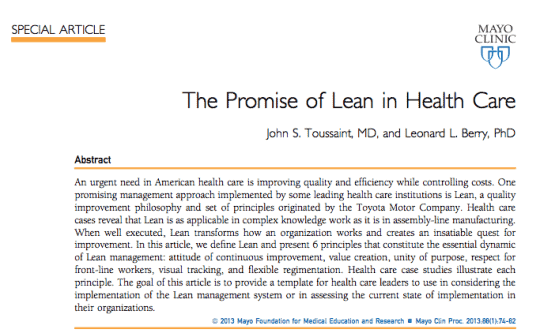As he mentioned on his blog, John Toussaint has co-authored a piece that was published in the Mayo Clinic Proceedings:
“The Promise of Lean in Health Care” (PDF).
John is excited that the article will be read by many physicians, given where it was published.
The piece was co-authored with Leonard L. Berry, PhD, from Texas A&M. Professor Berry was “embedded” at ThedaCare for a year, studying the use and the impact of Lean management and improvement methods there and at other health systems.
Click on the image below to read more:

The article gives a great deal of attention to the need to engage all employees in the improvement of their own work – otherwise known as Kaizen. Leaders need to change their leadership styles to shift from being top-down to being a coach and mentor.
From the piece:
Lean is a cultural transformation that changes how an organization works; no one stays on the sidelines in the quest to discover how to improve the daily work. It requires new habits, new skills, and often a new attitude throughout the organization from senior management to front-line service providers
Leaders must:
For Lean to take hold in an organization and transform its culture to one of continuous improvement, senior management must relinquish the role of master problem solver to those who are closer to the problems to be solved to benefit from their knowledge of the focal process, to give them hands-on experience in using Lean methods and to see first-hand the performance improvement and teamwork this can create, and to promote an attitude that what exists can likely be improved.
Respect for workers is critical:
Lean, in a sense, turns leadership upside down, with front-line workers doing much of the innovating and managers trusting them to do it and supporting them. Respect for the potential of front-line workers to have the brainpower and commitment to improve the work must pervade the organization. Respect flows downward, not just upward.
Be sure to read the whole article.
Also, check out the education offerings from John and the ThedaCare Center for Healthcare Value, including my workshop – Lean Fundamentals for Healthcare Leaders.
Here is a video of Toussaint talking about the article:
What do you think? Please scroll down (or click) to post a comment. Or please share the post with your thoughts on LinkedIn – and follow me or connect with me there.
Did you like this post? Make sure you don't miss a post or podcast — Subscribe to get notified about posts via email daily or weekly.
Check out my latest book, The Mistakes That Make Us: Cultivating a Culture of Learning and Innovation:









Good stuff, Mark. I had the opportunity to visit ThedaCare in December. It’s great to see what they’ve been able to accomplish live and in color. Our tour guides added some small subtleties that, if you are paying attention, indicate how deep in the organization the continuous improvement philosophy is embedded.
Mark, thanks for highlighting this article-it’s excellent! It does an especially fine job of melding the science-oriented and culturally focused duality of lean. I think clinicians will value the clear expression of how lean is based in the scientific method and at the same time appreciate the cultural and organizational elements that are critical to success.
Dale
Mark, a great article filled with all that hospitals could be. It is also a sad reminder to me that my hospital isn’t even close and that there are a lot of institutional and cultural barriers still to overcome. However, it gives me hope for the future!
[…] Toussaint, MD Mayo Clinic Proceedings: “The Promise of Lean in Health Care” (PDF) – which I blogged about earlier. In this podcast, Len talks about his time being embedded in ThedaCare and the lessons he learned […]